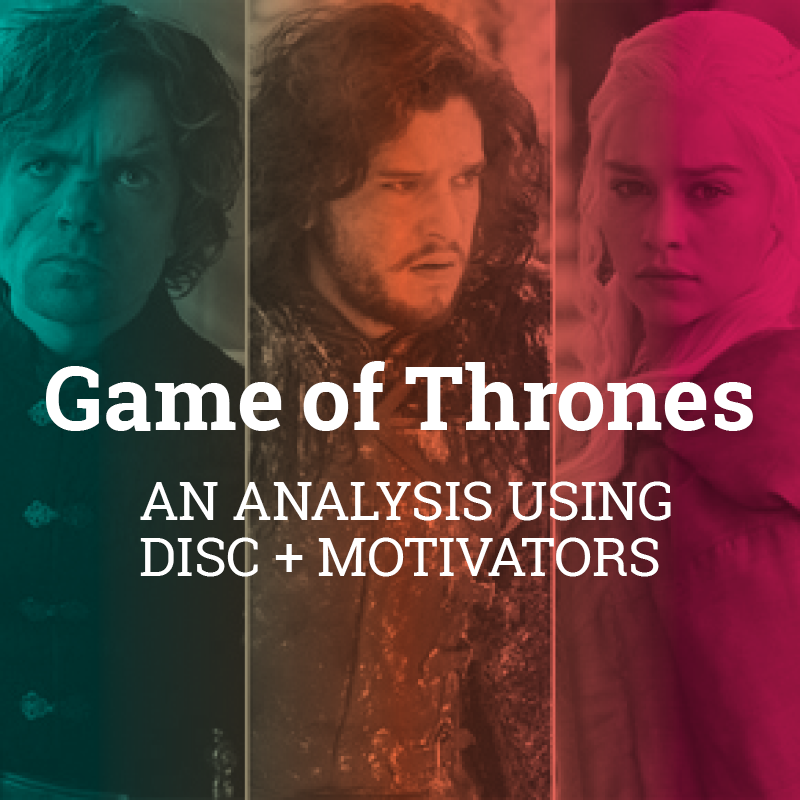Game of Thrones is one of the biggest shows to hit TV in recent decades. The breadth of characters (and the nuances within the characters' personalities) makes it a great educational resource to use in the training room when exploring people's DISC and Motivators profiles. DISC measures common behavioural tendencies, which when viewed in isolation only give a portion of the picture. Using DISC and Motivators profiles simultaneously gives a more holistic view of a person.
Let us look at two characters from Game of Thrones as an example of this. Petyr Baelish and Ned Stark share the same high "C" behavioural style. They are both portrayed as quiet, cautious and calculated in how they communicate and interact in their dealings with others. They are, however, completely different at a motivators (or values) level. Petyr seems to have virtually no interest in alleviating human suffering or serving the people he leads (low "Social" motivator). In every respect, his energy, time and interests are directed toward the attainment and maintenance of power and status (high "Individualistic" motivator). Ned demonstrates a very different value system. For one thing, he has a compassionate side (high "Social" motivator) and it's abundantly clear that he does not want power for himself and has no interest in sitting on the Iron Throne (low "Individualistic" motivator). Even though he has influence in his position of leadership, he only wants to use it to help his people and serve the greater good.
Motivators totally change the dynamic
It's important to emphasise that there is no "best" motivator. The "Individualistic" motivator is not necessarily "bad." It only indicates an interest in leading, power and individuality. The "Individualistic" (or any of the motivators for that matter) can appear good or bad depending on the ethics of the person in question. In Petyr's particular case, he is an extreme example of someone who will throw anyone under the bus (or wagon) to get what he wants; with silent, cunning precision.
Ignoring the motivators component removes what is arguably the most important and powerful element of someone's personality. When you understand someone's core motivators, you understand what really makes them tick (what things will create joy, energy and engagement; and what things will irritate, bore and create tension). Speak to a person's core motivators and you speak to their innermost self. This is one reason why, if you are only using DISC, you are missing a huge chuck of the picture.
I have put together an infographic for you to highlight particular DISC-Motivator combinations from the Game of Thrones show, and focus on selective quotes that best illustrate a particular aspect of a given motivator. It is important to recognise that, even though we have only listed 1 DISC factor and 1 motivator for each example, everyone has a combination of all four DISC behaviours and all six motivators at varying degrees of intensity. It's the unique interplay of multiple factors in which the richest and most valuable insights will be gained.
Quick Reference Guide
DISC
- Dominance: Outgoing + Task Focused (tends to be direct, forceful, assertive, etc.)
- Influence: Outgoing + People Focused (tends to be outgoing, talkative, enthusiastic, etc.)
- Steadiness: Reserved + People Focused (tends to be steady, stable, easy going, etc.)
- Compliance: Reserved + Task Focused (tends to be careful, precise, analytical, etc.)
Motivators/Values
- Theoretical: A drive for knowledge and learning.
- Utilitarian: A drive for practicality, value and ROI.
- Aesthetic: A drive for beauty and creative expression.
- Social: A drive for compassion and helping others.
- Individualistic: A drive for power, status and to lead.
- Traditional: A drive for unity, order and a system for living.
Character images and quotes for Game of Thrones are owned by George R.R. Martin and HBO DISC and Motivators models are owned by TTI Success Insights
I hope you enjoyed the article and I look forward to reading your thoughts below. If you are interested in exploring DISC and the Motivators further, Scope Vision is able to assist you, don't hesitate to contact them direct.
Till next time.... Theo
Our featured guest blogger
Theo Winter works as Client Services Manager, Writer & Researcher for TTI Success Insights Australia, a leading provider of assessment-based talent management solutions. He is among the youngest in the world to have received accreditation in the TTI Success Insights suite of assessments, and has worked with hundreds of HR, L&OD professionals and business consultants seeking to bolster the emotional intelligence, engagement and performance of managers and their teams. Theo is passionate about positive psychology, neuroscience, intelligence, science education, creativity and personal development literature. He has written over 200 articles on topics such as leadership, recruitment, talent management, performance management, employee engagement, psychometric testing, career development, emotional intelligence, psychology and human behaviour.











